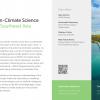Dr. Rym Msadek, New CLIVAR SSG Member
Latest News
We are pleased to introduce our new CLIVAR logo, developed in alignment with the new World Climate Research Programme (WCRP) brand identity launched in 2024.
You are invited to submit your work to the Research Topic in Frontier
The Pan-CLIVAR Meeting 2025 was held in Bali, Indonesia, from 22nd to 26th of September 2025, attended by over 150 in-pe
The call for nominations to the CLIVAR panels and Scientific Steering Group (SSG) is CLOSED with appointment starting in January 2026 and January 2027 respectively. Deadline for the submission was 3 October 2025.
Science Highlights
Please have a look at the Guidelines for Science Highlights
A new study published in Climate Dynamics provides compelling evidence that this warming pattern has emerged in observations during 1979–2020, and is primarily driven by external forcing—particularly from greenhouse gases (GHGs) and anthropogenic aerosols.
Figure 1. More persistent cold conditions in boreal spring and early summer after a multiyear La Niña, compared to those before a strong El Niño (left, a, c), inhibit an eastward movement an
Our CLIVAR member Satyaban Bishoyi Ratna from Climate Dynamics Panel and Monsoons Panel recently published the article which explored two distinct types of evolution in La Niña and the associated asymmetry in the response of the ISMR. It was observed that India receives significantly more and less rainfall during ELLA and LALA events, respectively, and ISMR has a spatial diversity with a northeast-southwest dipole pattern.
Publications and Documents
Upcoming Events
| Event | City | Country | Dates |
|---|---|---|---|
| Joint Conference:"Abrupt changes and tipping points" by 6th CLIVAR CDP workshop & MEC2026 | Guangzhou | China |
2026-04-13 to 2026-04-16 |
| 2026 PRP Workshop on PATAC and TP BGC-PIs - Tokyo, Japan | Tokyo, Japan |
2026-05-21 to 2026-05-22 |
|
| Third International Conference on Subseasonal to Seasonal to Decadal Prediction (S2S2D) | Reading | United Kingdom |
2026-09-07 to 2026-09-11 |

























